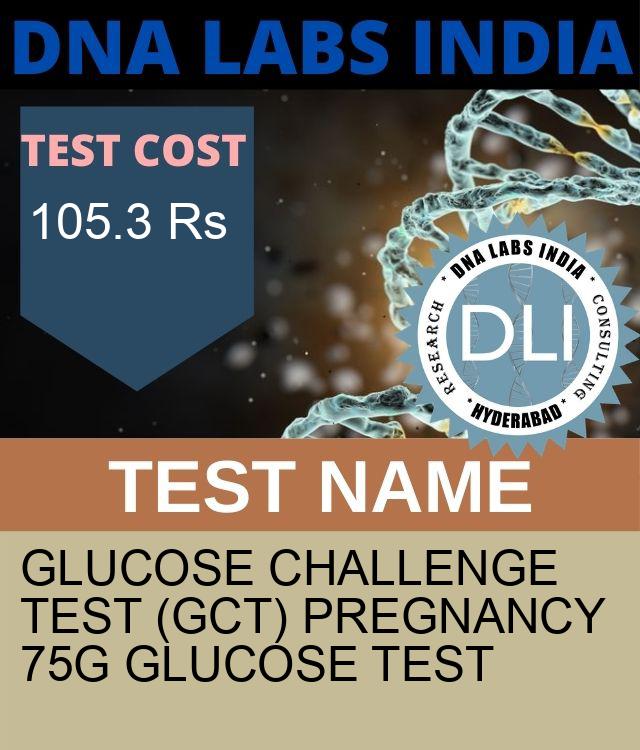Why to get tested at DNA Labs India for GLUCOSE CHALLENGE TEST (GCT) PREGNANCY 75g GLUCOSE Test ?
Book Now
-
3500 Sample collection centers, Free Home Sample
collection for GLUCOSE CHALLENGE TEST (GCT) PREGNANCY 75g GLUCOSE Test in your city
-
Ranked India No1 DNA Test Lab for
GLUCOSE CHALLENGE TEST (GCT) PREGNANCY 75g GLUCOSE Test
-
Most Trusted Lab by doctors for GLUCOSE CHALLENGE TEST (GCT) PREGNANCY 75g GLUCOSE Test. Call 07941057551 to talk with Doctor to
get second opinion for free of cost
-
GLUCOSE CHALLENGE TEST (GCT) PREGNANCY 75g GLUCOSE Test Cost 105.3 Rs
GLUCOSE CHALLENGE TEST (GCT) PREGNANCY 75g GLUCOSE Test Details
GLUCOSE CHALLENGE TEST (GCT) PREGNANCY 75g GLUCOSE Test cost INR:105.3 symptoms diagnosis
Pregnancy is a crucial time for every woman, and it's essential to monitor your health to ensure a healthy pregnancy. Glucose Challenge Test (GCT) is a test used to diagnose gestational diabetes, which is a type of diabetes that affects pregnant women. Gestational diabetes can cause complications for both the mother and the baby, so it's important to diagnose and manage it as early as possible.
What is Glucose Challenge Test (GCT)?
During pregnancy, the placenta produces hormones that can make it difficult for your body to use insulin effectively. This condition is known as insulin resistance, and it's normal during pregnancy. However, in some women, the insulin resistance is too high, leading to gestational diabetes.
The Glucose Challenge Test (GCT) is a screening test used to diagnose gestational diabetes. The test involves drinking a sugary drink and then measuring your blood sugar levels after an hour. The test is usually done between 24 and 28 weeks of pregnancy, and it's a routine part of prenatal care in most countries.
What are the symptoms of gestational diabetes?
Gestational diabetes doesn't usually cause any symptoms, which is why it's important to get tested. However, some women may experience the following symptoms:
- Frequent urination
- Increased thirst
- Fatigue
- Blurred vision
- Nausea
How is Glucose Challenge Test (GCT) done?
The Glucose Challenge Test (GCT) is a simple test that takes about an hour to complete. Here's how it's done:
- You'll be asked to drink a sugary drink that contains 75 grams of glucose.
- After an hour, a blood sample will be taken from your arm.
- The blood sample will be sent to a lab for analysis.
- Your doctor will discuss the results with you.
What is the cost of Glucose Challenge Test (GCT) in India?
The cost of Glucose Challenge Test (GCT) in India can vary depending on the location and the lab. On average, you can expect to pay around INR 105.3 for the test. However, the cost may be higher or lower depending on where you live.
What happens if you fail the Glucose Challenge Test (GCT)?
If your blood sugar levels are higher than normal after the Glucose Challenge Test (GCT), your doctor may recommend a follow-up test called the Glucose Tolerance Test (GTT). The GTT is a more comprehensive test that involves drinking a sugary drink and then measuring your blood sugar levels over a period of three hours.
If you're diagnosed with gestational diabetes, your doctor will work with you to develop a treatment plan to manage your blood sugar levels. This may include making changes to your diet and exercise routine, monitoring your blood sugar levels regularly, and possibly taking medication.
Conclusion
The Glucose Challenge Test (GCT) is a simple and effective way to diagnose gestational diabetes. If you're pregnant, it's important to get tested to ensure a healthy pregnancy for both you and your baby. The test is affordable, and it's a routine part of prenatal care in most countries. If you have any concerns about gestational diabetes or the Glucose Challenge Test (GCT), talk to your doctor.
Remember, early detection and management of gestational diabetes can help prevent complications and ensure a healthy pregnancy.
It is a Single-step procedure developed by DIPSI to diagnose Gestational Diabetes due to the practical difficulty in performing glucose tolerance tests in the fasting state.
